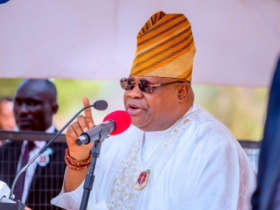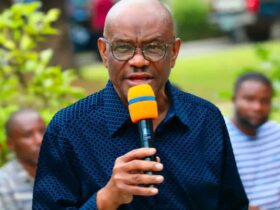A Federal High Court, Abuja, on Wednesday, ruled that the Peoples Democratic Party (PDP) has the right to suspend or expel former Governor of Rivers, Nyesom Wike, if the action is done in accordance with the law.
Justice James Omotosho stated this in a judgment he delivered on a suit filed by Wike, prior to the 2023 general elections.
The legal action had prevented the party from taking action against Wike whose acts were against the National leadership of PDP through the campaign.
Former Rivers State Governor, Wike , the leader of a power block had sued the PDP, its National Working Committee (NWC) and National Executive Committee (NEC) as 1st to 3rd respondents following the moves to suspend him for anti party activities.
Delivering judgement on Wednesday, Justice Omotosho said the court had considered the processes filed by parties and arguments of counsel and found as follows:
That suspending or expelling the applicant without affording him the right to defend himself would breach his fundamental rights as enshrined in the party’s and Nigeria’s constitutions.
That though the party had the right to suspend or expel its members, this must be done in compliance with its own law.
The judge said that though Section 46(1) of the law vested jurisdiction on the court if one’s rights had been breached, same court would not dabble into the internal affairs of any political party, except where the right of a member had been violated by the party without recourse to its own laws.
According to him, fundamental human rights are rights enshrined in the constitution of Nigeria and are sacrosanct.
“Where this right ought to be enforced, the court will do everything within its reach to ensure this.
“However, as fundamental and sacrosanct these rights are, they are not absolute,” he said.
Justice Omotosho, therefore, agreed that any member of a political party who appeared before a disciplinary committee, should be given the opportunity to defend himself.
“And if not, any decision taken shall be null and void,” he said. “This court is convinced that the applicant is entitled to a fair hearing and that the respondent also has the rights to discipline its members in accordance with the law.”
The judge further said that Wike had the right to associate and that the threat to dismiss him without inviting him to defend himself contravened Article 57 (1)(2) of the party.
He said that the party’s National Chairman, Dr Iyorchia Ayu, and his agents, were bound to promote constitutional democracy.
Wike, in the suit, marked: FHC/ABJ/CS/139/2023 dated and field Feb. 2 ,2023 by his lawyer, Joshua Musa, SAN, had joined the National Chairman of PDP, Dr Iyorchia Ayu; National Secretary of PDP, Senator Samuel Anyanwu, and the Independent National Electoral Commission as 4th to 6th respondents respectively.
He had prayed for an order directing all parties to maintain the status quo and stay all actions in the matter relating to the threat to suspend or expel him by the 1st to 5th respondents pending the hearing and determination of the originating motion.
He asked the court to enforce his fundamental right to freedom of association which was allegedly about to be breached by the respondents.
But the PDP, through its lawyer, Johnson Usman, SAN, disagreed with Wike’s submission.
He argued that the case was only based on speculation as Wike had failed to provide any evidence to substantiate that the respondents intended to suspend or expel him from the party.
He said the party had not contemplated suspending or expelling members of the G5 Governors or the Integrity Group, despite engaging in anti-party activities.
He said Wike and four other governors engaged in anti-party activities by forming the Integrity Group and campaigning for another presidential candidate in the Feb. 25 election.
The senior lawyer argued that a member, who voluntarily joined an association, must abide by its rules.
Usman, who argued that the ex-governor must have exhausted the internal mechanism of the party first, said the court lacked the jurisdiction to entertain the matter, which, he said, was only within the realm of conjuncture.
He further argued that it was not enough for Wike to institute the suit on fundamental rights enforcement grounds.
Justice Omotosho had, on Feb. 2, given an interim order against the party and others listed in the face of Wike’s ex-parte motion.
The judge, who extended the restraining order on Feb. 14, held that all parties should maintain a status quo pending the hearing and determination of the suit










Leave a Reply